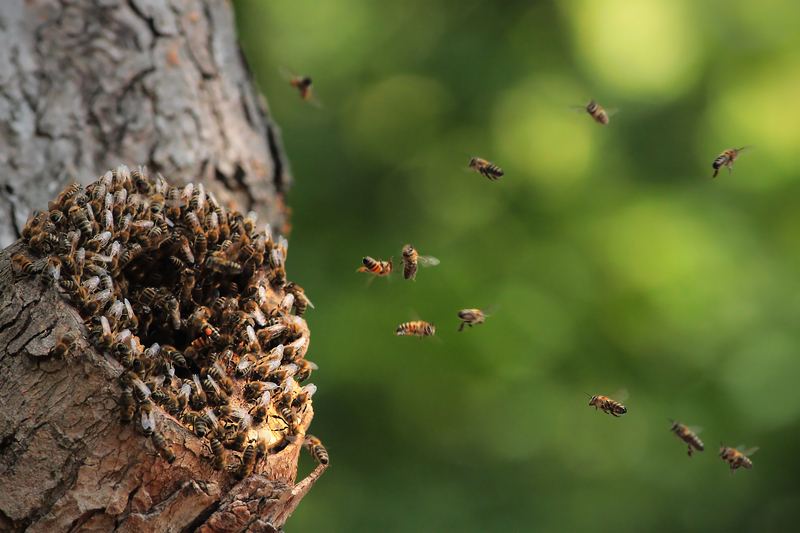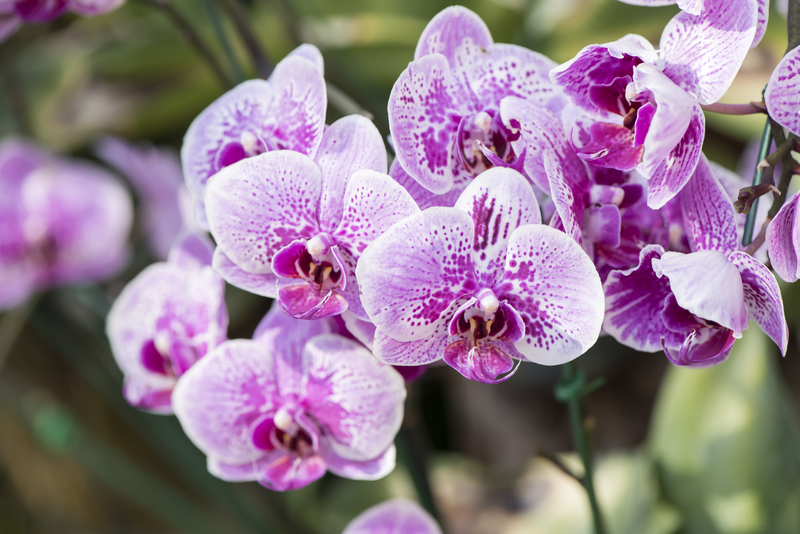Unlock the Secret to Weed Control: 3 Tips
Posted on 17/06/2025
Weeds are among the most persistent adversaries that gardeners and lawn enthusiasts face. While the goal is a lush and healthy landscape, these pesky intruders can quickly disrupt your plans, competing with your valued plants for water, nutrients, and sunlight. Are you struggling with weed management, too? You're not alone. However, unlocking the secret to effective weed control does not require an arsenal of toxic chemicals or endless hours of back-breaking labor.
This in-depth article reveals three powerful yet simple tips for weed control that every homeowner and gardener should implement. Whether your objective is a flawless lawn, a thriving vegetable patch, or vibrant flower beds, these weed prevention techniques will put you on the path to long-term success.
Understanding the Weed Problem
Before diving into the top strategies for weed management, it's crucial to grasp what makes these invaders such formidable foes. Weeds are any plants growing where you don't want them. They are notorious for their rapid growth, adaptive nature, and ability to outcompete your chosen vegetation. But not all weeds are the same -- some are annuals, some perennials, and others, biennials. Effective garden weed control requires both knowledge and action.
Below, you'll uncover the fundamental principles you need to unlock the true secret to weed management.

3 Tips to Achieve Effective Weed Control
1. Mulching: Nature's Protective Blanket
One of the most effective weed control methods is also one of the simplest and most eco-friendly: mulching. Applying a layer of organic or inorganic mulch in your garden suppresses weeds in several powerful ways.
- Blocks Sunlight: Mulch acts as a barrier, preventing sunlight from reaching weed seeds, thereby inhibiting germination and growth.
- Retains Moisture: While mulch keeps weeds at bay, it also helps your soil retain moisture--meaning less watering for you.
- Improves Soil Quality: Organic mulches like straw, wood chips, or compost slowly break down over time, enriching your soil with nutrients.
- Temperature Regulation: Mulch keeps roots cool in summer and insulated in winter, providing an overall healthy environment for your desired plants.
When using mulch for weed prevention, remember these essential tips:
- Apply a thick layer--at least 2-3 inches --over bare soil or around your plants.
- Keep mulch a few inches from stems and trunks to avoid rot or pest issues.
- Replenish mulch as needed to maintain its effectiveness.
Organic mulches such as shredded leaves, bark, straw, and compost are ideal for gardens and flower beds. Inorganic options like black plastic or landscaping fabric deliver longer-term suppression for paths, perennial beds, or under gravel.
2. Consistent, Strategic Hand Weeding
While it might sound old-fashioned, regular hand weeding remains a cornerstone of long-term weed management. Hand-pulling, when done correctly, can remove weeds before they set seed and spread further. The key is to be both consistent and strategic in your approach.
- Act Early: Catch weeds when they're young and haven't yet begun to flower or produce seeds.
- Root Removal: Ensure you pull the entire root system, especially with perennial weeds like dandelions or bindweed, to prevent regrowth.
- Moist Soil Weeding: After rain or a deep watering, soil is softer and roots come out more easily--helping you avoid breakage.
- Use Proper Tools: Employ tools like a weeding fork, dandelion digger, or a hori-hori knife for stubborn or deep-rooted weeds.
Build hand weeding into your weekly gardening routine during the growing season. Tackling a handful of weeds each week is far more effective (and less intimidating) than waiting for a jungle to develop.
Weed control landscaping strategies always emphasize the importance of "one year's seeding--seven years' weeding." Prevent weeds from setting seeds, and you'll make next year's job far easier!
3. Healthy Lawn and Garden Care: Your First Line of Defense
Did you know that the best way to prevent weeds is to create conditions where they struggle to grow? A dense, healthy lawn or well-tended garden will naturally crowd out unwanted interlopers. Here's how to use proper plant care as a weed management tool:
- Mow Grass High: Keep lawn grass 3-4 inches tall. Taller grass shades soil, depriving weed seeds of light.
- Fertilize Appropriately: Don't over-fertilize, which can fuel weeds more than turf. Use a slow-release, balanced fertilizer and follow the recommended schedule for your grass or plant type.
- Overseed Thin Lawns: In early fall or spring, overseed patchy areas to thicken your lawn and reduce space for weeds to take hold.
- Water Deeply, Not Frequently: Deep, infrequent watering encourages deeper root growth among your turf and garden plants while discouraging shallow-rooted weeds.
- Rotate Crops and Plant Densities: In vegetable and annual flower gardens, switch plant types each year and maximize spacing to outperform weed growth.
Strong plants, closely spaced, form a living mulch that shades and outcompetes weeds. Combined with targeted garden weed control methods, you'll see substantially fewer weeds over time.
Bonus Strategies for Weed Prevention and Management
While mulching, hand weeding, and overall garden health form the core of weed control, supplementary techniques can help you stay ahead of weed invasions:
- Landscape Fabric: For planting beds, use weed barrier fabrics beneath mulch to block weeds from below.
- Flame Weeders: Employ flame weeding (carefully!) on driveways, patios or gravel paths as an organic alternative to herbicides.
- Boiling Water and Homemade Sprays: Scald weeds in cracks or use vinegar/soap solutions for spot treatments. Use caution as these kill all plants they touch!
- Solarization: In off-seasons, cover soil with clear plastic to bake and kill weed seeds (and some pathogens) with the sun's heat.
These supplementary weed management methods can offer extra protection for gardens with chronic weed problems or in areas difficult to hand weed.
Avoiding Common Weed Control Mistakes
Even with good intentions, it's easy to make mistakes that complicate weed management. Here's what to avoid:
- Ignoring Weeds Until They're Out of Control: Procrastination allows weeds to establish deep roots and produce seeds--making control more challenging.
- Under- or Over-Mulching: Too little mulch does not suppress weeds; piling mulch too high or onto plant stems encourages rot and pests.
- Disturbing Soil Unnecessarily: Tilling or hoeing can bring dormant weed seeds to the surface, triggering a fresh outbreak.
- Relying Only on Herbicides: Chemical weedkillers can be an occasional tool, but overuse leads to resistance, environmental damage, and safety risks.
Integrated weed management --using several of the methods outlined here--always works better than any "miracle" product or shortcut.
Seasonal Weed Control Tactics
Adapting your approach to the time of year increases the effectiveness of your weed prevention strategy:
- Spring: Mulch early, overseed lawns, and begin monitoring and pulling young weeds before they flower.
- Summer: Maintain mulch levels, continue regular hand weeding, and increase mowing frequency if needed.
- Fall: Remove any late-sprouting weeds, top up garden beds with compost or mulch, and overseed lawns.
- Winter: Plan crop rotations, apply landscape fabric where needed, and repair or reinforce physical barriers like edging.
By staying on top of weeds year-round, you'll prevent seasonal flare-ups and minimize the "seed bank" in your soil.
Why Organic Weed Control is Better for You & the Planet
Modern agriculture and landscaping often rely on chemical herbicides, but these products can disrupt soil life, water quality, and even human health. Instead, the natural weed control methods above offer sustainable solutions and contribute to a healthier ecosystem:**
- Safeguard pollinators and beneficial insects essential for fruit and vegetable crops.
- Protect soil microbes which help break down organic material and supply nutrients to your plants.
- Reduce runoff and pollution that result from chemical leaching into waterways.
- Create a safer environment for kids, pets, and wildlife.
Integrating natural weed control methods makes your garden both productive and environmentally responsible.

Frequently Asked Questions About Weed Control
What is the best way to permanently get rid of weeds?
There is no absolute "permanent" solution, but by using a combination of dense planting, regular hand weeding, thorough mulching, and proper lawn care, you will progressively starve out weeds and drastically minimize their presence.
Does vinegar kill weeds safely?
Household vinegar can kill young, tender weed growth on contact but is less effective on established or perennial weeds. It can also harm any plant it touches, so apply carefully as a spot treatment only.
How do I stop weeds from growing in my garden naturally?
- Apply thick organic mulch each season.
- Keep soil covered with healthy crops or groundcovers.
- Remove weeds promptly before they set seed.
- Use landscape fabric for persistent problem areas.
Is pulling weeds a waste of time?
Not at all! While it requires consistency, each weed you remove before seeding dramatically reduces next year's weed pressure. Over time, diligent hand pulling pays big dividends in easier, fewer weeds to manage.
Conclusion: Take Control and Enjoy a Weed-Free Garden
When it comes to unlocking the secret to weed control, there's no magic bullet--but there are smart, sustainable strategies that truly work. Start by mulching properly, maintain a schedule of strategic hand weeding, and focus on keeping your lawn and gardens as healthy as possible. Complement these practices with seasonal maintenance and, where appropriate, additional non-toxic controls like landscape fabric or targeted natural sprays.
Your reward? Less time fighting weeds, and more time enjoying a beautiful, thriving outdoor space.
Implement these 3 proven tips for weed management, and you'll unlock the secret to a weed-free landscape--naturally, safely, and effectively!
If you're ready for a garden transformation, put these weed control solutions to work today and watch as your plants flourish, weeds retreat, and your dream garden becomes reality!
Latest Posts
Gardening: Protecting Our Planet One Plant at a Time
Curating a Garden Adventure for Your Dog
Maximizing Plant Protection Against Windy Conditions

